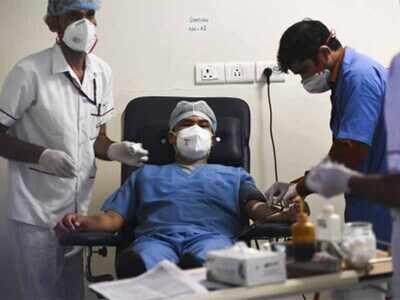Top Searches
- News
- India News
- Why some women can't donate plasma for Covid-19 patient
Why some women can't donate plasma for Covid-19 patient

Convalescent plasma — the liquid part of the blood containing antibodies against SARS-Cov-2 developed in patients who have recovered from Covid-19 — has become a sought-after therapy in several cases to cure people suffering from the viral infection. There are however, certain conditions about who can and who cannot donate plasma — and one category is women who have ever been pregnant.
Why is that? According to medical experts, women, during their pregnancy develop antibodies — called human leucocyte antigens (HLA) — against the father's genetic material. In fact, greater the number of successful pregnancies a woman has, greater the HLA count.
Once developed, they are present in the blood forever. Though HLA antibodies are not harmful to the person who made them, if transfused to another person they can cause a rare but serious complication in the transfusion recipients known as Transfusion-Related Acute Lung Injury (TRALI).
Since Covid-19 patients requiring plasma transfusion usually have their lungs weakened by the virus, transfusing the plasma of a woman who's been pregnant in her life could prove fatal.

It isn't just women though — several men too won't make the list of plasma donors since the requirements are extremely strict. For one, plasma can only be donated after a minimum of 14 days from recovery. Donors need to be at least 18 years old and not more than 60 years of age, weigh at least 50 kg, have a haemoglobin count of at least 8, do not suffer from any chronic kidney, heart, lung or liver disease and don't suffer from diabetes.
Even cancer survivors aren't eligible for plasma donation. More importantly, their blood pressure needs to be not more than 140 and diastolic not less than 60 or more than 90.
India's first plasma bank opened in Delhi this week, set up at the Institute of Liver and Billiary Science in Delhi. Delhi chief minister Arvind Kejriwal has appealed to people who have recovered from Covid-19 and are eligible to volunteer to donate plasma, which when infused into the body of another person suffering from Covid-19 may help fight the disease.
Because it takes weeks for antibodies to form, the hope is that transfusing someone else's antibodies could help patients fight the virus before their immune system kicks in.
Plasma therapy is not new. In 1918, during the outbreak of the flu pandemic, plasma therapy was used on patients.
Why is that? According to medical experts, women, during their pregnancy develop antibodies — called human leucocyte antigens (HLA) — against the father's genetic material. In fact, greater the number of successful pregnancies a woman has, greater the HLA count.
Once developed, they are present in the blood forever. Though HLA antibodies are not harmful to the person who made them, if transfused to another person they can cause a rare but serious complication in the transfusion recipients known as Transfusion-Related Acute Lung Injury (TRALI).
Since Covid-19 patients requiring plasma transfusion usually have their lungs weakened by the virus, transfusing the plasma of a woman who's been pregnant in her life could prove fatal.

It isn't just women though — several men too won't make the list of plasma donors since the requirements are extremely strict. For one, plasma can only be donated after a minimum of 14 days from recovery. Donors need to be at least 18 years old and not more than 60 years of age, weigh at least 50 kg, have a haemoglobin count of at least 8, do not suffer from any chronic kidney, heart, lung or liver disease and don't suffer from diabetes.
Even cancer survivors aren't eligible for plasma donation. More importantly, their blood pressure needs to be not more than 140 and diastolic not less than 60 or more than 90.
India's first plasma bank opened in Delhi this week, set up at the Institute of Liver and Billiary Science in Delhi. Delhi chief minister Arvind Kejriwal has appealed to people who have recovered from Covid-19 and are eligible to volunteer to donate plasma, which when infused into the body of another person suffering from Covid-19 may help fight the disease.
Because it takes weeks for antibodies to form, the hope is that transfusing someone else's antibodies could help patients fight the virus before their immune system kicks in.
Plasma therapy is not new. In 1918, during the outbreak of the flu pandemic, plasma therapy was used on patients.
FacebookTwitterLinkedinMail
Start a Conversation
end of article
Trending Topics
Quick Links
Coronavirus in MumbaiCoronavirus in KolkataCoronavirus in HyderabadCoronavirus in DelhiCoronavirus in BangaloreCoronavirus symptomsCoronavirus in IndiaWhat is CoronavirusCoronavirus NewsSolar EclipseNPRWhat is NRCCAB BillCAB and NRCRTI BillPodcast newsLok SabhaShiv SenaYSRCPCongressBJP newsUIDAIIndian ArmyISRO newsSupreme Court